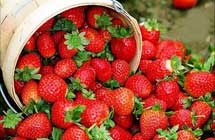“最脏”果蔬榜发布 草莓再次高居榜首
|
Once again, strawberries top the list of the 12 "dirtiest" fruits and vegetables, according to the Environmental Working Group. The list, published each year since 2004, ranks popular fruits and vegetables based on pesticide contamination. The group found that one third of all conventional, or non-organic, strawberry samples contained 10 or more pesticides. One sample of strawberries was found to have an "astounding" 22 pesticide residues, EWG said.
Spinach, the second produce item on the list, contained pesticide residues in 97 percent of conventional, or non-organic, samples. Additionally, more than 98 percent of samples of strawberries, peaches, potatoes, nectarines, cherries and apples tested positive for residue of at least one pesticide, according to the activist group. EWG emphasizes studies that show pesticides in high concentration can lead to health problems, especially in young children. The report is based on tests conducted by the US Department of Agriculture and the Food and Drug Administration on more than 38,800 non-organic fruit and vegetable samples. While pesticides boost crop yields, there are concerns about the impact on people who consume food produced this way — even with Maximum Residue Limits of pesticides that have been set by the government. Studies have linked pesticide-laden produce to everything from asthma and cancer to fertility problems and brain conditions. “All adults and children should eat more fruits and vegetables, whether they are organic or conventionally grown,” the EWG noted on its site. But the group urges consumers who eat the dirty dozen produce to go the organic route. Rinsing produce under tap water for 30 seconds is an effective way to get rid of pesticide residues, according to the Connecticut Agricultural Experiment Station, cnn reports. On another note, the EWG’s “Clean Fifteen” list reveals the produce containing the least amount of pesticides. “It is vitally important that everyone eats plenty of produce, but it is also wise to avoid dietary exposure to toxic pesticides, from conception through childhood,” said Sonya Lunder, senior analyst with EWG. “With EWG’s guide, consumers can fill their fridges and fruit bowls with plenty of healthy conventional and organic produce that isn’t contaminated with multiple pesticide residues.” Dirty Dozen 1. Strawberries 草莓 2. Spinach 菠菜 3. Nectarines 油桃 4. Apples 苹果 5. Grapes 葡萄 6. Peaches 桃子 7. Cherries 樱桃 8. Pears 梨子 9. Tomatoes 西红柿 10. Celery 芹菜 11. Potatoes 土豆 12. Sweet bell peppers 甜椒 Clean Fifteen 1. Avocados 牛油果 2. Sweet corn 甜玉米 3. Pineapples 菠萝 4. Cabbages 卷心菜 5. Onions 洋葱 6. Sweet peas, frozen 香豌豆(冷冻) 7. Papayas 木瓜 8. Asparagus 芦笋 9. Mangoes 芒果 10. Eggplants 茄子 11. Honeydew melons 蜜瓜 12. Kiwis 猕猴桃 13. Cantaloupes 甜瓜 14. Cauliflower 花椰菜 15. Broccoli 西兰花 |









